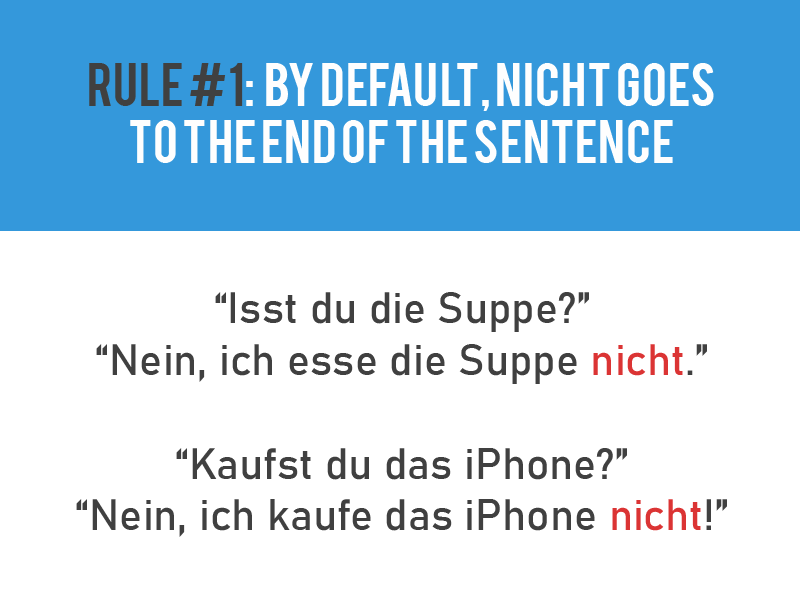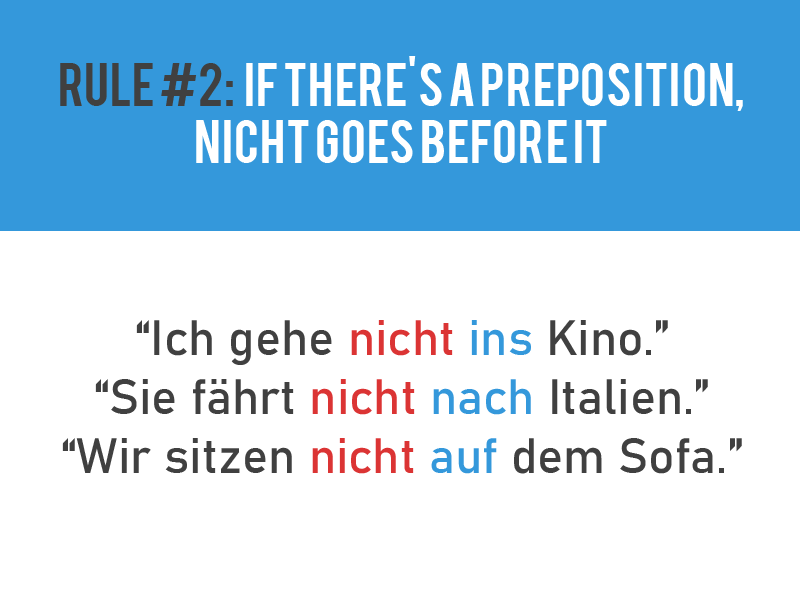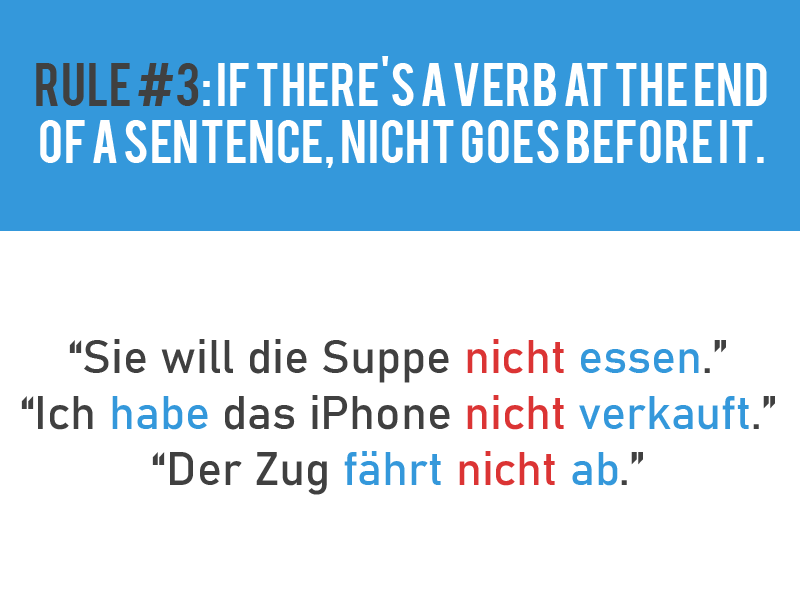
German syntax can be quite daunting. There are many moving parts. It can be helpful to split things up into smaller more manageable bits. Earlier today for example a question came up on the newsletter about the correct placement of the so-called Negationspartikel nicht in a sentence.
So here are 3 very simple rules (and some exceptions) for putting your nicht into the correct position in a sentence. Ready? Los geht’s!
Rule #1: By Default, Nicht Goes To The End Of The Sentence

When you’re negating a verb, a noun or a whole sentence using nicht, it generally goes to the end of the sentence. This is the default setting.
Here are some examples:
“Magst du Katzen?”
“Nein, ich mag Katzen nicht.”
“Kennst du den neuen Film mit Keanu Reeves?”
“Nein, ich kenne den Film nicht.”
Simple enough, isn’t it? But this rule only comes into play as long as rule 2 or 3 don’t apply.
Rule #2: If there’s a Preposition, Nicht Goes Before It

This is another very simple rule which should be fairly self-explanatory. As you may remember, some prepositions in German require the accusative case (durch, bis, für, ohne, entlang, gegen, um, etc.), others the dative case (bei, mit, seit, aus, zu, nach, von, etc.). But they all have one thing in common: when they appear in a sentence nicht goes first.
Here are some more examples:
“Fliegst du im Sommer nach Amerika?”
“Nein, ich fliege nicht nach Amerika.”
“Fährst du entlang des Flusses?” (along the river)
“Nein, ich fahre nicht entlang des Flusses.”
There is one little exception where this rule doesn’t apply, which may not be that common, but I wanted to mentioned it anyway. If the preposition appears in position 1 in the sentence we revert to our default setting and nicht moves to the end of the sentence.
“Wartest du auf den neuen Marvel-Film?”
“Nein, auf den warte ich nicht.”
“Liegt Peter im Bett?”
“Nein, im Bett liegt er nicht.”
Last but not least, this rule also applies to modal adverbs. Whenever there’s a word in your sentence that qualifies the verb, i.e. provides information how an action is being done, nicht goes first:
“Fährt Peter langsam?”
“Nein er fährt nicht langsam.”
“Arbeitest du viel?”
“Nein, ich arbeite nicht viel.”
“Isst du gerne Pizza?”
“Nein, ich esse nicht gerne Pizza.”
Rule #3: If there’s a Verb at the End of a Sentence, Nicht Goes Before it

This may sound simple but requires a bit more explanation. Why? Because sometimes verbs consist of multiple parts that appear in different places. Remember separable verbs, i.e. “trennbare Verben”, those pesky German verbs that split in two, for example?
So let’s make this as simple as possible. Whenever there’s a verb at the end of the sentence, or even just part of a verb, put your nicht in front of it.
Here are some examples:
First of all, here’s a case where the verb at the end is in infinitive:
“Kannst du programmieren?”
“Nein, ich kann nicht programmieren.”
Next up, here’s an example where the verb is part of the Perfekt, i.e. perfect tense. Although the complete verb form consists of two verbs (auxiliary + participle), nicht always goes in front of the part of the verb at the end:
“Hast du die Katze gesehen?”
“Nein, ich habe die Katze nicht gesehen.”
The same thing happens with separable verbs, as mentioned before:
“Bringst du deinen Freund mit?” (mitbringen: to bring along)
“Nein, ich bringe meinen Freund nicht mit.”
“Bricht Sarah ihr Studium ab?” (abbrechen: to drop out)
“Nein, Sarah bricht ihr Studium nicht ab.”
Summary
It’s not always easy to analyze syntax and identify grammatical elements correctly. But if you memorize these three rules you should always be confident in placing your negation particle “nicht” exactly where it belongs.
Did you find this helpful? Would you like more explanations like these for other topics?
Just let me know!
👉Exercise
Now, let’s test what we’ve learned. Drag the negation particle into the correct position:
Did you get everything right? If not, review the rules and try again!
Understanding the Difference Between Nicht and Kein in German
Since this is somewhat related, many people are wondering when to use “nicht” vs “kein”. The answer is pretty simple:
In German, both “nicht” and “kein” are used to express negation, but they are used in different ways depending on the context.
1. “Nicht” is used to negate a verb, adjective or adverb. Examples:
- Er spricht nicht viel. (He doesn’t speak much.)
- Das ist nicht schön. (That’s not nice.)
- Ich gehe nicht oft ins Kino. (I don’t go to the cinema often.)
2. “Kein” is used to negate a noun and means “not a” or “no.” It is used to express the absence of something, and it changes its form depending on the gender and number of the noun it negates. Examples:
- Ich habe kein Auto. (I don’t have a car.)
- Sie hat keine Bücher. (She doesn’t have any books.)
- Das ist kein Problem. (That’s not a problem.)
Further examples to show how nicht and kein correlate to the negated verbs, adverbs, adjectives and nouns:
1. Use “nicht” for negating verbs, adverbs and adjectives:
“Ich gehe nicht oft ins Kino.” nicht -> oft (adverb)
“Sie mag das Essen nicht.” nicht -> mögen (verb)
“Sie sind nicht freundlich.” nicht -> freundlich (adjective)
2. Use “kein” for negating nouns:
“Ich mag keine Hamburger. ” keine -> Hamburger (noun)
“Kein Mensch mag schlechtes Wetter.” kein -> Mensch (noun)
“Wir verstehen kein Spanisch.” kein -> Spanisch (noun)
To simplify this rule:
If you want to negate a noun, use “kein”. For everything else, use “nicht”.
–

